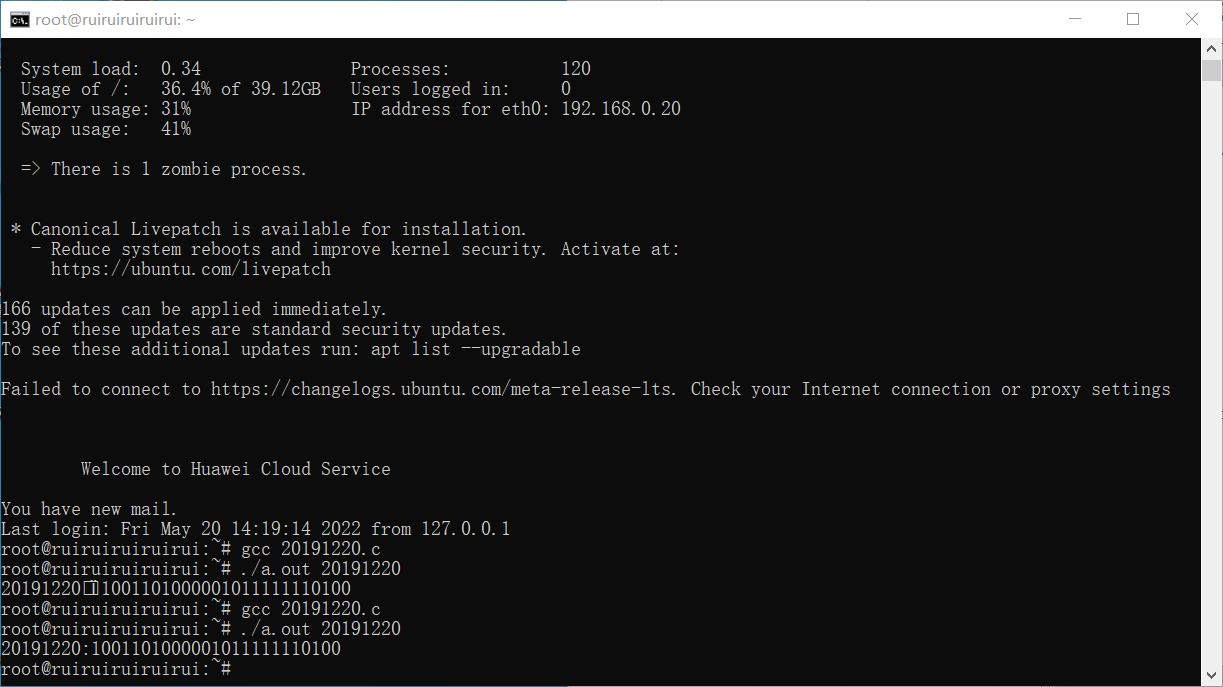数据转换-位串字节数组
0. 在openEuler(推荐)或Ubuntu或Windows(不推荐)中完成下面任务
1 参考《GMT 0009-2012 SM2密码算法使用规范》第6节“数据转换” 在utils.h和utils.c中完成位串与8位字节串的转换功能(10'):
int Bitstr2ByteArr(unsigned char * bs, unsigned char * ba,int *lba);
int ByteArr2Bitstr(unsigned char * ba, unsigned char * bs, int *lbs);
2 并写出测试代码测试上述函数(不能与下面代码一样),比如(10'):
unsigned char bs [] = "1010010100011100";
int len;
Bitstr2ByteArr(bs, char * ba, &len);
//结果:ba = {0x5, 0x1C}; len=2
char ba[] = {0x5, 0x1C}
ByteArr2Bitstr(char * ba, char * bs);
//结果:bs= "1010010100011100"
3 提交代码(或代码链接)和运行结果
#include "sdf.h" #include <stdio.h> #include <stdlib.h> int main(){ void ** pdh; pdh = (void **) malloc(20); int ret; ret = SDF_OpenDevice(pdh); if(ret != SDR_OK){ printf("error!"); } else { printf("device opened!\n"); } DEVICEINFO testdi; ret = SDF_GetDeviceInfo(pdh, &testdi); if(ret != SDR_OK){ printf("error!"); } else { printf("Issuer Name: %s\n", testdi.IssuerName); printf("Device Name: %s\n", testdi.DeviceName); printf("Device Serial: %s\n", testdi.DeviceSerial); printf("Device Version: %d\n", testdi.DeviceVersion); } char pRandom[10]; ret = SDF_GenerateRandom(*pdh,10, pRandom); if(ret != SDR_OK){ printf("error!"); } else { for(int i=0; i<10; i++) printf("%d\n", pRandom[i]); } ret = SDF_CloseDevice(*pdh); if(ret != SDR_OK){ printf("error!"); } else { free(pdh); printf("device closed!\n"); } return 0; }
#include "sdf.h" #include <string.h> #include <time.h> #include <stdlib.h> //******************************** //设备管理 //******************************** int SDF_OpenDevice(void ** phDeviceHandle){ return SDR_OK; } int SDF_CloseDevice(void *hDeviceHandle){ return SDR_OK; } int SDF_GetDeviceInfo( void * hSessionHandle, DEVICEINFO * pstDeviceInfo) { DEVICEINFO di; strcpy(di.IssuerName,"RocSDF"); strcpy(di.DeviceName,"SDFBESTI"); strcpy(di.DeviceSerial,"2021040001"); di.DeviceVersion = 1; //... //pstDevicelnfo = &di; *pstDeviceInfo = di; return SDR_OK; } static int myRandom(){ srand((unsigned)time(NULL)); return rand(); } int SDF_GenerateRandom (void * hSessionHandle, unsigned int uiLength, unsigned char * pucRandom){ for(int i=0; i<uiLength; i++){ sleep(2); *(pucRandom+i) = myRandom(); // pucRandom[i] = i; } return SDR_OK; }
#include <stdio.h> #include "util.h" char HStr = {'0', '1', '2', '3', '4', '5', '6', '7', '8', '9', 'A', 'B', 'C', 'D', 'E', 'F' }; char Hex2Char(int i){ return HStr[i]; }
对我的学号进行转换








【推荐】国内首个AI IDE,深度理解中文开发场景,立即下载体验Trae
【推荐】编程新体验,更懂你的AI,立即体验豆包MarsCode编程助手
【推荐】抖音旗下AI助手豆包,你的智能百科全书,全免费不限次数
【推荐】轻量又高性能的 SSH 工具 IShell:AI 加持,快人一步
· 分享一个免费、快速、无限量使用的满血 DeepSeek R1 模型,支持深度思考和联网搜索!
· 基于 Docker 搭建 FRP 内网穿透开源项目(很简单哒)
· ollama系列01:轻松3步本地部署deepseek,普通电脑可用
· 25岁的心里话
· 按钮权限的设计及实现